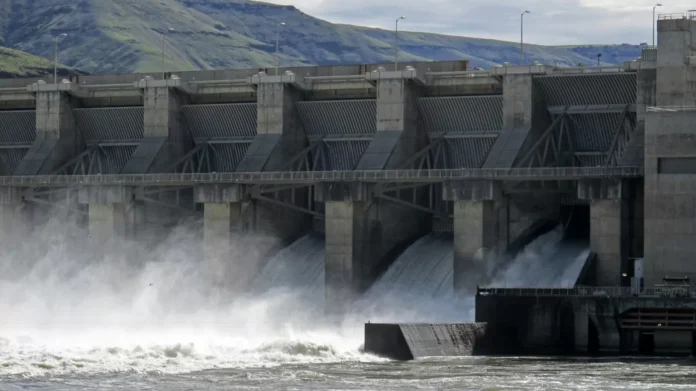The western United States has long been known for its vast and diverse landscapes, from the towering mountains to the sprawling deserts. But as the effects of climate change continue to be felt across the region, the focus has shifted towards finding sustainable solutions for the future. One of the key areas of concern is the decarbonization of electricity grids, with many states setting ambitious targets to achieve this by 2050. However, a new study has found that these plans may be much more expensive than anticipated, as they fail to account for the impact of climate change on water resources.
The study, conducted by researchers at the University of California, Davis, and published in the journal Environmental Research Letters, highlights the potential consequences of warming temperatures on hydropower production in the western U.S. According to the study, shifts in water availability due to climate change could lead to a decrease in hydropower production by up to 23 percent by midcentury. This could have significant implications for the region’s plans to decarbonize its electricity grids, as hydropower currently accounts for a significant portion of the region’s renewable energy production.
The western U.S. has been a leader in renewable energy, with states like California, Washington, and Oregon setting ambitious targets to reduce their carbon emissions and transition to clean energy sources. However, these targets may not be achievable if the effects of climate change on water resources are not taken into account. The study’s lead author, Dr. Ted Grantham, explains, “Our findings suggest that the current plans for decarbonization may not be enough to mitigate the impacts of climate change on water resources and hydropower production.”
The study looked at the potential impacts of climate change on water resources and hydropower production in the western U.S. using a combination of climate and hydrological models. The results showed that as temperatures continue to rise, there will be a decrease in snowpack and earlier snowmelt, leading to reduced water availability for hydropower production. This is particularly concerning for states like California, which rely heavily on hydropower to meet their renewable energy goals.
The study’s findings have significant implications for the region’s plans to decarbonize its electricity grids. As Dr. Grantham points out, “The costs associated with adapting to these changes in water availability could be substantial and could potentially undermine the economic feasibility of decarbonizing the electricity sector.” This means that the region may need to reassess its targets and come up with more realistic and sustainable solutions.
However, the study also offers some hope. It suggests that by implementing adaptive management strategies, such as increasing water storage capacity and improving water management practices, the impacts of climate change on hydropower production could be mitigated. This highlights the importance of taking a holistic approach to decarbonization, one that considers the interplay between climate change, water resources, and renewable energy production.
The study’s findings also serve as a wake-up call for policymakers and decision-makers in the western U.S. It is crucial that they take into account the potential impacts of climate change on water resources when setting targets and developing plans for decarbonization. As Dr. Grantham states, “We need to start thinking about how we can adapt to these changes and develop more resilient energy systems.”
The western U.S. has always been a region of innovation and forward-thinking, and it is time to apply this mindset to the challenge of decarbonizing electricity grids. The study’s findings may present a hurdle, but they also offer an opportunity to develop more sustainable and resilient solutions. By taking a proactive approach and considering the impacts of climate change on water resources, the region can continue to lead the way in renewable energy and create a more sustainable future for generations to come.
In conclusion, the western U.S.’s plans to decarbonize its electricity grids by 2050 may face significant challenges due to the impacts of climate change on water resources. However, with proper planning and adaptive management strategies, these challenges can be overcome. It is time for the region to come together and find innovative solutions that not only reduce carbon emissions but also ensure the sustainability of its water resources. Let us continue to be leaders in renewable energy and pave the way towards a greener and more sustainable future.

